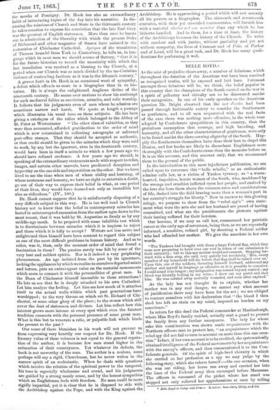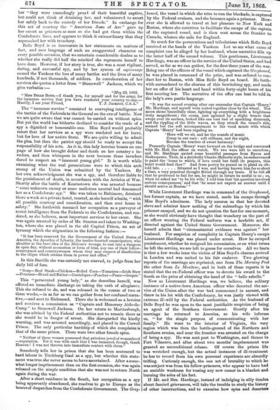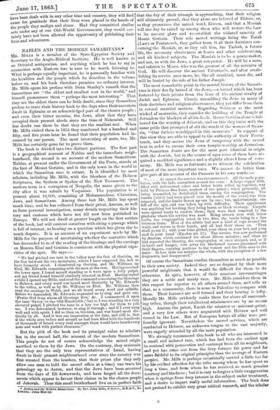BELLE BOYD.* As the mist of prejudice clears away, a
number of delusions, which throughout the duration of the American war have been received as recognized truths, will be exposed and laid bare. Foremost amongst these delusions will be, we think, the belief popular in this country that the champions of the South carried on the war in a spirit of gallantry and chivalry not to be discovered amidst their antagonists. In one of his early speeches on the American question Mr. Bright observed that the mot d'ordre had been passed through fashionable society to consider the Southerners as gentlemen, and to all men acquainted with the real facts of the case there was nothing more offensive, in the whole tone adopted by Confederate sympathizers in this country, than the gratuitous assumption that courage, and high breeding, and humanity, and all the other characteristics of gentlemen, were only to be found amidst the slave-owning oligarchy of the South. Hap- pily the Southerners themselves have done their best to dispel this illusion, and few books are likely to disenchant Englishmen more thoroughly with the Confederate cause than the memoirs before us. It is on this account, and this account only, that we recommend them to the perusal of the public.
In the introduction to this most injudicious publication, we are called upon to reverence this " belle rebelle," as an enthusiastic admirer calls her, as a victim of Yankee tyranny, as " a warm- hearted, impulsive, heroic woman of the South, who, maddened by the wrongs and cruelties inflicted upon her people, and exalted by the love she bore them above the common cares and considerations of life, dashed into the field braving more than a woman's part in her country's struggle for liberty." Now in answer to this glowing eulogy, we purpose to show from the " rebel spy's " own state- ment what were the acts she and her husband are proud of having committed, and what are the punishments she piotesta against their having suffered for their heroism.
Our heroine, if we may so call her, commenced her patriotic career at the early age of seventeen, being then, as we are repeatedly informed, a sensitive, refined girl, by shooting a Federal soldier who had offended her mother. We give the anecdote in her own words.
"The Yankees had brought with them a large Federal flag, which they were now preparing to hoist over our roof in token of our submission to their authority ; but to this my mother would not consent. Stepping for- ward with a firm step, she said, very quietly but resolutely, Men, every member of my household will die before that flag shall be raised over us.' Upon this, one of the soldiers, thrusting himself forward, addressed my mother and myself in language as offensive as it is possible to conceive. I could stand it no longer ; my indignation was roused beyond control ; my blood was literally boiling in my veins ; I drew out my pistol and shot him. He was carried away mortally wounded, and soon after expired."
As the lady has not thought fit to explain, whether her mother was in any real danger, we cannot say what amount of justification there may have been for the act ; we are obliged to content ourselves with her declaration that " the blood I then shed has left no stain on my mind, imposed no burden on my conscience."
In return for this deed the Federal commander at Martinsburgh, where Miss Boyd's family resided, actually sent a guard to protect the family from any further annoyance. The lady for whose sake this consideration was shown made acquaintance with the Northern officers sent to protect her, " an acquaintance which the rebel spy did not fail to turn to account on more than this one occa- sion." Inflict, if her own account is to be credited, she systematically obtained intelligence of the Federal movements by her acquaintance with the enemy's officers, and then communicated it to the Con- federate generals. Of the spirit of high-bred chivalry in which she carried on her profession as a spy we may judge by the following story, which she relates herself :—On one occasion, when she was out riding, her horse ran away and carried her into the lines of the Federal army then encamped before Manassas. The officers in command of the picket where her steed was stopped not only relieved her apprehensions at once by telling
• Belle Boyd in Camp and Prison. Landon: Saunders, Otley, and Co.
her "they were exceedingly proud of their beautiful captive, but could not think of detaining her, and volunteered to escort her safely back to the custody of her friends." In exchange for this act of courtesy the " American Joan of Arc" gave up her escort as prisoners as soon as she had got them within the Confederate lines, and appears to think it extraordinary that they reproached her with treachery.
Belle Boyd is so inaccurate in her statements on matters of fact, and uses language of such an exaggerated character on every possible occasion, that we entertain considerable doubts as to whether she really did half the mischief she represents herself to have done. However, if her story is true, she was a most vigilant, daring, and successful spy, and by her system of espionnage caused the Yankees the loss of many battles and the lives of many hundreds, if not thousands, of soldiers. In corroboration of her services she quotes a letter from " Stonewall " Jackson, which we
give verbatim :—
"May 23, 1862. "Miss BKLLE Born,—I thank you, for myself and for the army, for the immense service that you have rendered your country to-day.-
Hastily, I am your Friend, T. J. JACKSON, C.S.A."
The " immense service " consisted in conveying intelligence of the tactics of the Federals to the General on the eve of battle. Now we are quite aware that war cannot be carried on without spies. But yet the world has hitherto declined to consider the trade of a spy a dignified or honourable one. Miss Boyd would probably retort that her services as a spy were rendered not for lucre, but for love of her native State. We are quite willing to admit the plea, but then the patriot spy should be ready to accept the responsibility of his acts. As it is, this lady heroine boasts on one page of how she brought defeat and death on her country s in- vaders, and then whimpers in the next because these invaders dared to suspect an "innocent young girl." It is worth while examining what the real persecutions were to which this arch enemy of the Union was submitted by the Yankees. By her own acknowledgment she was a spy, and therefore liable to the punishment of death, in accordance with the Articles of War. Shortly after the battle of Kearnstown she was arrested because " some unknown enemy or some malicious neutral had denounced her as a Confederate spy." She was taken to Baltimore, detained there a week at a private hotel, treated, as she herself admits, " with all possible courtesy and consideration, and then sent home in safety." She forthwith resumed her occupation as a purveyor of secret intelligence from the Federals to the Confederates, and ren- dered, as she believes, most important services to her cause. She was again arrested by order of Mr. Stanton and taken to Washing- ton, where she was placed in the old Capitol Prison, an act of tyranny which she stigmatizes in the following fashion :— " It has been reserved for the Government of the United States of America, the Apostles of Liberty, the tender-hearted emancipators, who shudder at the bare idea of the African's wrongs, to cast into a dungeon in open day, without accusation or form of trial, any one of their fellow- countrymen and countrywomen whom they may suspect of disaffection to the clique which retains them in power and office."
In this Bastille she was certainly not starved, to judge from her daily bill of fare.
"Soup—Beef Steak—Chicken—Boiled Corn—Tomatoes—Irish Stew —Potatoes--Bread and Butter—Cantelopes —Peaches —Pears—Grapes."
This "persecuted young lady," as she describes herself, was offered an immediate discharge on taking the oath of allegiance. This she refused to do, and was released in the course of two or three weeks,—in as far as we can gather from her confused narra- tive,—and sent to Richmond. There she is welcomed as a heroine and receives a commission as " Captain and Honorary Aide-de- Camp" to Stonewall Jackson. On her return to Martinsburgh, she was advised by the Federal authorities not to remain there as she would be in danger of arrest. She disregarded the kindly warning, and was arrested accordingly, and placed in the Carroll Prison. The only particular hardship of which she complains is that of the same prison. There were two other female spies.
"Neither of these women possessed that priceless jewel of womanhood —reputation. Yet it was with such that I was immured, though, thank Heaven ! I was not thrown into immediate contact with them."
Somebody tells her in prison that she has been sentenced to hard labour in Titchburg Gaol as a spy, but whether this state- ment was true she never seems to have ascertained. After a some- what longer imprisonment than on the first occasion, she was again released on the simple condition that she was not to return North again during the war.
After a short residence in the South, her occupation as a spy being apparently abandoned, she resolves to go to Europe as the bearer of despatches from the Confederate Government. The Grey- hound, the vessel in which she tries to run the blockade, is captured by the Federal cruisers, and she becomes again a prisoner. How- ever she is allowed to travel at her pleasure to New York and
Boston, where she contrives to facilitate the escape of the captain of the captured vessel, and is then sent across the frontier to Canada, whence she sails for England.
So much for the persecutions and tribulations which Belle Boyd received at the hands of the Yankees. Let us see what cause of complaint can be alleged by her husband, whose narrative fills up the latter half of the second volume. This gentleman, Lieutenant Hardinge, was an officer in the service of the United States, and had served, as far as we can gather, for the first three years of the war_ Being one of the officers of the vessel which captured the Greyhound, he was placed in command of the prize, and was ordered to con- duct her to Boston, with Miss Belle Boyd on board. He forth- with surrendered to the charms of this bewitching spy, and made her an offer of his heart and hand within forty-eight hours of his first meeting her. The narrative of the offer can best be told in
the lady's own poetic language.
"It was the second evening after our surrender that Captain 'Henry,' Mr. Hardinge, and myself were seated together close by the wheeL The moon shone beautifully clear, lighting up everything with a brightness truly magnificent ; the ocean, just agitated by a alight breeze that swept over its surface, looked like one vast bed of sparkling diamonds, and the rippling of the little waves, as they struck the vessel's side, seemed but the soft accompaniment to the vocal music with which Captain Henry' had been regaling us.
Here will we sit, and let the sounds of music Creep in our ears : soft stillness, and the night, Become the touches of sweet harmony.'
Presently Captain 'Henry' went forward on the bridge and conversed with Mr. Hall, the officer on watch. We two were left to ourselves ; and Mr. Hardinge quoted some beautiful passages from Byron and Shakespeare. Then, in a decidedly Claude-Melnotte style, he endeavoured to paint the home to which, if love could but fulfil its prayers, this heart would lead thee !' And from poetry he passed on to plead an oft- told tale Situated as I was, and having known him for so short a time, a very practical thought flitted through my brain. If he felt all that he professed to feel for me, he might in future be useful to us ; so, when he asked me to be his wife,' I told him that 'his question involved serious consequences,' and that 'he must not expect an answer until I should arrive at Boston.' "
While Lieutenant Hardinge was in command of the Greyhound, her former captain, as we have stated, made his escape through Miss Boyd's adroitness. The lady assures us that her devoted slave and admirer knew nothing of the subterfuge by which his
prisoner escaped, and we do not question the fact for one moment,
as she would obviously have thought that treachery on the part of an officer wearing the Federal uniform was a laudable act, if directed against the United States Government. Moreover, she herself admits that "circumstantial evidence was against" her husband. For suspicion of complicity in Captain Henry's escape
Lieutenant Hardinge was placed under arrest. How he escaped punishment, whether he resigned his commission, or on what terms he left the service, we are left to guess for ourselves. All we learn is that a few weeks later the victim of Miss Boyd's charms arrived in London and was united to his fair enslaver. Two glowing
reports of the marriage are reprinted, one from The Morning Post the other from Le Moniteur, and in both of these reports it is
stated that the ex-Federal officer was to devote his sword to the South as the price of obtaining the hand of the " belle rebelle." Now as Lieutenant Hardinge was, we believe, the solitary instance of a native-born American officer who deserted the ser- vice of the Union after the war had commenced in earnest, and threw in his lot with the Confederacy, he was justly viewed with extreme ill-will by the Federal authorities. As the husband of Belle Boyd he was open to the most justifiable suspicion of being an agent of the Southern Government. Shortly after his marriage he returned to America, as his wife informs us, " for the simple purpose of communicating with her family." He went to the interior of Virginia, the very region which was then the battle-ground of the Northern and
Southern armies, and near the frontier was arrested on the charge of being a spy. He was sent post to Washington, and thence to Fort Vilanuve, and after about two months' imprisonment was
granted an unconditional release. Of course the prison life was wretched enough, but the actual instances of ill-treatment he has to record from his own personal experience are absurdly trifling. Curiously enough, the one act of brutality to which he was subject was from his fellow-prisoners, who appear to have had an amiable weakness for tossing any new corner in a blanket and burning the soles of his feet. If Mr. and Mrs. Hardinge, instead of indulging in silly tirades about fancied grievances, will take the trouble to study the history of other insurrections, and to examine how spies and deserters
have been dealt with in any other time and country, they will find cause for gratitude that their lives were placed in the hands of the people they malign and abuse. Had they committed similar acts under any of our Old-World Governments, they would cer- tainly have not been allowed the opportunity of publishing their lives and adventures.
































 Previous page
Previous page